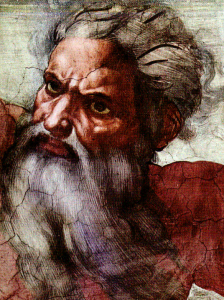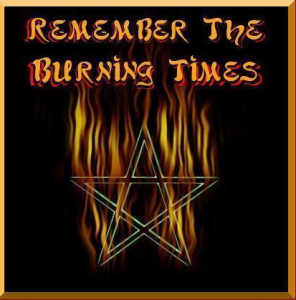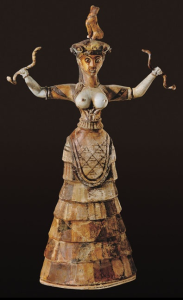I just read a post by John Halstead in his blog, The Allergic Pagan. It was entitled “Believing in Our Myths, Without Believing in Them”. I don’t always agree with what this guy has to say, but he always makes me think, and this post was no exception. It is definitely worth reading.
One thing it made me think about is that perhaps we don’t understand the ancient myths in the same way that their creators–the Egyptians, Celts, Greeks, Norse, etc.–did. The ancients didn’t have history, they had stories.* Some of these stories were so effective on a spiritual/emotional level that they were told and retold and eventually became myths. The myths of these cultures were as true to them as what they did yesterday, but I think they understood in a way that we don’t that there are different truths. Today we look at stories as either true or untrue, fact or fiction. If something actually happened it becomes history which we lump into the category of fact, if it didn’t we call it fiction or myth.

The one, the only, image by Michelangelo
We also live in an essentially a monotheistic culture of Christians, Jews, Muslims, Mormons, etc. Your average, run-of-the-mill monotheist believes there is only one true God.** And most, but not all, monotheists believe that their myths are historically true. The fact that they are”true”, according to modern thought, makes them somehow more “right” than the Greek, Norse, Celtic, and Egyptian myths. But we pagans now have more recent stories that inspire us–The Burning Times and The Civilization of the Goddess to mention just two. And these stories are actually based on historical fact, and so, like any conservative monotheist, we insist that the stories we tell each other about them are “real truth.”
In my opinion, this is both unnecessary and spiritually counter-productive. These stories should be viewed primarily (but, not totally) as myths. When a story is told as “real, historical truth”–although I would debate whether such a thing actually exists–it, by definition, tends to become correct or incorrect, which then implies right or wrong, which then degenerates to good or bad, black and white, good guys and bad guys, and, ultimately, and here is the problem, us and them.
Myths always occurs outside of our own socio-political context and are therefore timeless. The Burning Times and The Civilization of the Goddess are events that we know actually took place in our own world and we tell them in our socio-political context:
- “Between the 15th and 16th centuries the Catholic Church, the religious patriarchy of the Western World, in it’s effort to totally eradicate paganism in

Yes, we should. But what exactly should we remember? The evils of Catholocism and the Patriarchy or religious tolerance? image by magickalgraphics.com Europe, burned almost 60,000 people at the stake, most of whom were helpless women…”
- “In Neolithic times “God was a Woman”. And what is today Eastern Europe was ruled by women and The Goddess. There were no wars and everyone lived in peace, harmony, and abundance until warlike, patriarchal invaders from the steppes of Asia swept in…”
But I think it is more productive to tell these stories in a mythical context:
- “Once upon a time in a kingdom far away, a king decided that everything would be better if everyone in his kingdom believed the same thing. His courts, when charged with making his desires come true, found that the people who were most different in their beliefs and whose influence was most insidious were women. To make these women confess what they believed, the judges developed cruel tortures and when the women were found guilty, they burned them alive as an example to others…”
- “Once upon a time there was a land that was ruled by women. There was no war and everyone lived in peace, harmony, and abundance until the civilization was destroyed by warlike nomads…”

Do you see the difference between the two tellings? When we tell these stories as actual happenings, segments of our society become villains and we are tempted to direct our anger and hate toward them instead of looking at the deeper meaning behind the events. But if we look at these stories as mythic events that happened long ago and far away they become useful spiritual lessons that do, indeed, stir up intense emotions and energies, but these emotions and energies are aimed at our own souls, not at a specific country, religion, gender, or institution. Like any other myth, they challenge each of us to change our ways of thinking and being in the world, which affects how we treat others and how we choose to exert our power in the world.
Which, actually, are the only things we can change.
Enjoy Halstead’s post!
*Herodotus (400BCE) is often called “the Father of History.” He is also called “the Father of Lies,” because not everything he wrote was accurate. Which means he was actually telling stories?
**Actually, there are many flavors of Monotheism.


6 thoughts on “The Burning Times and The Civilization of the Goddess: New Pagan Myths?”
One of the problems of telling stories in a way that bases them on historical facts is that it opens up battles about the details. Somebody says, well, those numbers are exaggerated or those dates don’t match or so and so wasn’t a real person. Once those things are said, it’s easy for the story to lose its punch and become something that has been disproven. Once that happens, the meanings and lessons are lost.
Yes, exactly!
Interesting article and commentary. I agree with his final conclusion that it’s not the historical fact that’s important but the meaning that the myth brings us. On a deeper level though, I believe as esotericists we realize myths have a reality of their own on deeper levels. IMO the deities “exist” in a manner more “real” than living persons in terms of their cultural longevity and archetypal significance.
I would agree.
Thank you Chrissy for discussing an incredibly important theme for modern polytheists.
I especially resonate with your writing, “The myths of these cultures were as true to them as what they did yesterday.”
An argument can be made that the role of mythology and (some) monotheistic religious stories is to provide spiritual lessons from which we can benefit.
You did a beautiful job of describing the burning times in a mythological context.
I think we tread incredibly dangerous ground when we begin to classify spiritual truths as right or wrong. Further, and sadly, I’ve found that modern-day pagans can be just as guilty of this as the monotheists.
What a person holds sacred (that which helps an individual connect with that which is spiritual) is just that – sacred. In walking my spiritual path I have been guided that judgement is an incredibly dangerous and potentially harmful endeavor. To engage in the judgement of spiritual truth is, in my opinion, especially tenuous.
You’ve given all of us a powerful and valuable reminder. Thank you again!
Namaste’
Rebecca
Thank you for taking the time to comment on this. When I post something that is just about my viewpoint I often wonder how someone else would interpret it.
Craig reads them all before I publish them and was thoroughly confused by this one. I did some fast rewriting in hopes of making it easier to follow.
Your comments about the post tell me that it said what I’d hoped it would say. This is a real moment of satisfaction for a writer.
Thank you again.